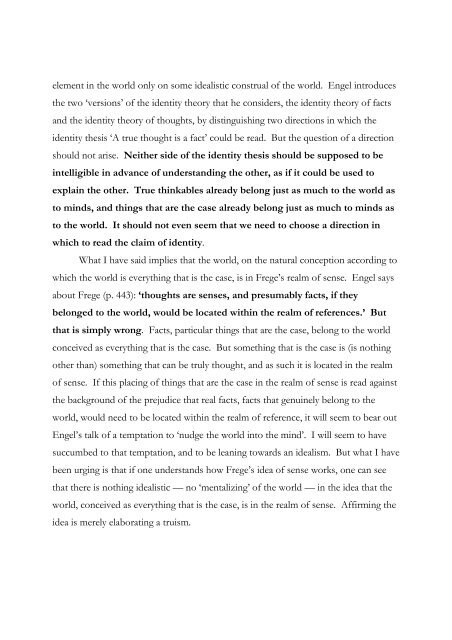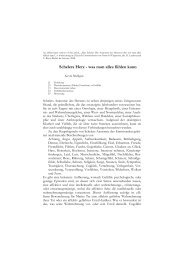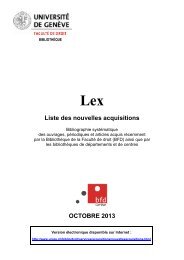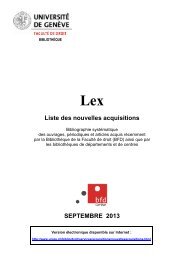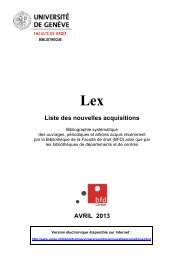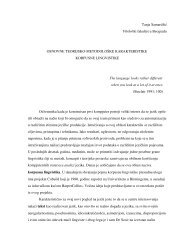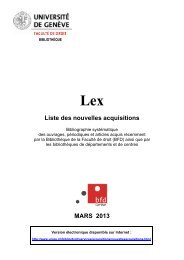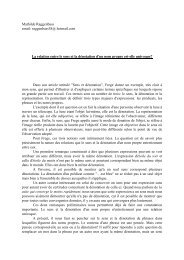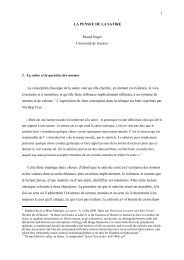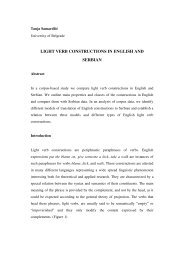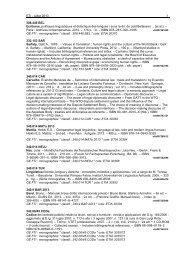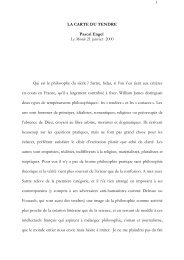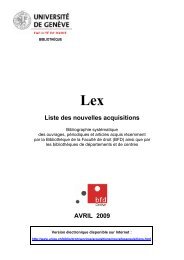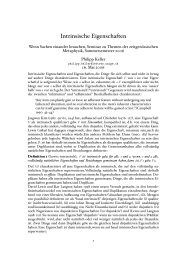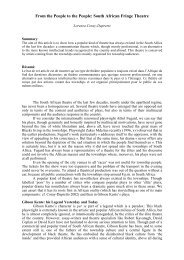2005 Unimportance of being modest A footnote to McDowel
2005 Unimportance of being modest A footnote to McDowel
2005 Unimportance of being modest A footnote to McDowel
You also want an ePaper? Increase the reach of your titles
YUMPU automatically turns print PDFs into web optimized ePapers that Google loves.
element in the world only on some idealistic construal <strong>of</strong> the world. Engel introduces<br />
the two ‘versions’ <strong>of</strong> the identity theory that he considers, the identity theory <strong>of</strong> facts<br />
and the identity theory <strong>of</strong> thoughts, by distinguishing two directions in which the<br />
identity thesis ‘A true thought is a fact’ could be read. But the question <strong>of</strong> a direction<br />
should not arise. Neither side <strong>of</strong> the identity thesis should be supposed <strong>to</strong> be<br />
intelligible in advance <strong>of</strong> understanding the other, as if it could be used <strong>to</strong><br />
explain the other. True thinkables already belong just as much <strong>to</strong> the world as<br />
<strong>to</strong> minds, and things that are the case already belong just as much <strong>to</strong> minds as<br />
<strong>to</strong> the world. It should not even seem that we need <strong>to</strong> choose a direction in<br />
which <strong>to</strong> read the claim <strong>of</strong> identity.<br />
What I have said implies that the world, on the natural conception according <strong>to</strong><br />
which the world is everything that is the case, is in Frege’s realm <strong>of</strong> sense. Engel says<br />
about Frege (p. 443): ‘thoughts are senses, and presumably facts, if they<br />
belonged <strong>to</strong> the world, would be located within the realm <strong>of</strong> references.’ But<br />
that is simply wrong. Facts, particular things that are the case, belong <strong>to</strong> the world<br />
conceived as everything that is the case. But something that is the case is (is nothing<br />
other than) something that can be truly thought, and as such it is located in the realm<br />
<strong>of</strong> sense. If this placing <strong>of</strong> things that are the case in the realm <strong>of</strong> sense is read against<br />
the background <strong>of</strong> the prejudice that real facts, facts that genuinely belong <strong>to</strong> the<br />
world, would need <strong>to</strong> be located within the realm <strong>of</strong> reference, it will seem <strong>to</strong> bear out<br />
Engel’s talk <strong>of</strong> a temptation <strong>to</strong> ‘nudge the world in<strong>to</strong> the mind’. I will seem <strong>to</strong> have<br />
succumbed <strong>to</strong> that temptation, and <strong>to</strong> be leaning <strong>to</strong>wards an idealism. But what I have<br />
been urging is that if one understands how Frege’s idea <strong>of</strong> sense works, one can see<br />
that there is nothing idealistic — no ‘mentalizing’ <strong>of</strong> the world — in the idea that the<br />
world, conceived as everything that is the case, is in the realm <strong>of</strong> sense. Affirming the<br />
idea is merely elaborating a truism.


